Abstract
Universities have been requested to assure production of “employable” graduates in connection with significant changes at the labor market and in the academic sector. Employability also tends to be one of the criteria for allocation of financial resources in the academic sector. The aim of the paper is analysis of the labour market and finding of causes of failure in employment and graduate employability of the Faculty of Forestry and Wood Technology Mendel University in Brno (Czech Republic) in practice. Results will serve to management as a strategic tool for decision-making in the areas of innovation and optimization of educational programs. To determine the theoretical background a secondary research based on review of domestic and foreign studies was used. In order to acquire primary data, in the practical part there was a questionnaire survey applied and realization of personal interviews with employers and another interested subjects. There was low graduate employability found by the questionnaire survey, especially in wood processing study programs. The reason is incompatibility of education with needs of wood processing operations. Potential employers require graduates to be significantly better prepared, especially regarding practical skills. A majority of potential employers of graduates of the Faculty of Forestry and Wood Technology Mendel University in Brno is willing to offer work internships and short-term practice.
Keywords: Employmentforestry and wood processing sectorquestionnaire surveymanagementeducationuniversity
Introduction
Universities form the highest level of the educational system. The role of universities lies in their ability to provide students with skills and abilities, which individuals need for performing of qualified work and which are required by employers and to provide adults with the opportunity to maintain and renew these skills and abilities during their working lives. Furthermore, it is necessary for universities to react well and flexibly to needs of employers and to put a greater emphasis on professional practice.
In a context of considerable changes in the labour market and higher education sector, universities are urgent to ensure that they produce “employable” graduates, and graduates themselves are exhorted to continually develop their personal skills, qualities and experiences in order to compete in the graduate labour market (Moreau & Leathwood, 2007). Universities across the globe are increasingly required to produce highly skilled graduates who are able to respond to the ever changing and complex need of the contemporary workplace (see e.g. Sleezer et al., 2004; Possa, 2006; Andrews & Higson, 2008). In addition to this, the rapid expansion of higher education across Europe over the past two or three decades has resulted in questions being raised about the quality of the graduate labour market and the ability of graduates to meet the needs of employers (see e.g. Askov & Gordon, 1999; Teichler, 2003; Elias & Purcell, 2004; Andrews & Higson, 2008).
According to Lees (2002) the term employability is a difficult concept to define succinctly and comprehensive. Fugate, Kinicki & Ashforth (2004) defined employability as a psycho-social construct comprised of three dimensions: adaptability, career identity and human and social capital. In the context of the Bologna Process (The Bologna Declaration, 1999), employability is understood as an ability to get a first job, keep a job and be able to move within the labor market.
The concept of employability is based on an individual's ability to adapt to the professional needs and recent dynamics of new labour markets, and it is directly linked to the ability to find and maintain employment (Hillage & Pollard, 1998). The knowledge, skills, and attitudes of each individual and the way they use them for their own benefit are key factors leading to employability (Rothwell, Jewells & Hardie, 2009). The employability is not only about shaping talent, techniques and experience for an individual to get a job, but more toward the ability to do the work (Schultz, 1963). Other concepts of employment are resulting from the publication e.g. Harvey (2001), Morley (2001), Wickramasinghe & Perera (2010) or Ang (2015).
The London communiqué (2007) from the meeting of ministers of the European Higher Education Area (EHEA) indicated that employability of university students is one of the priorities of university policy. The accent on cooperation between governments, universities, employers, employees and students is stated in the Communiqué of ministers of EHEA in Leuven/Louvain-la-Neuve (2009), eventually McKeown & Lindorff (2011). There are few studies from the perspective of graduates and how they make the transition from higher education to careers (Nystrom, 2008).
It is necessary to monitor employability in a wider macroeconomic context. It is significantly influenced by the development of economies of individual countries, the overall unemployment rate, demographic development, increase of the quantity of people with university education, etc. The problem is also competition of universities within the country but also in countries of the surrounding area.
In recent years, there has been a significant growth in the number of university students in the Czech Republic (Kreuzigerová, 2012). Young graduates have never had it easy in the labour market, however today their situation is even worse. The unemployment rate graduates in the Czech labour market increased to 19.1 %. (Sobotková & Dohnalová, 2014)
The paper brings the methodological approach and a part of results of the Subproject of the Institutional Plan of Mendel University in Brno no. 7.2 Analysis of employability of graduates of the Faculty of Forestry and Wood Technology in the labor market 2016 – 2018. The objective of the project is to create a rare complex analysis of the labor market of the forestry and wood technology sector in the South Moravian region created in cooperation with employers, representatives of professional institutions and labor offices, which will lead to determination of causes of employment failure and employability of graduates of the Faculty of Forestry and Wood Technology in practice.
The aim of the paper is to present some selected results of the analysis of the labour market and finding of causes of failure in employment and graduate employability of the Faculty of Forestry and Wood Technology Mendel University in Brno (FFWT MENDELU) in practice.
Material and Methodology
To determine the theoretical background a secondary research based on review of domestic and foreign studies was used. For the practical part, there was a case study created, which presents partial results of the research conducted in the year 2016 with the Subproject of the Institutional Plan of Mendel University in Brno no. 7.2 Analysis of employability of graduates of the Faculty of Forestry and Wood Technology in the labor market 2016 – 2018. The project contains 3 main activities. Until now, the first part of these three activities was realized: The analysis of the labor market in the forestry and wood technology sector, which solved the development of a number of students and successful graduates of the FFWT MENDELU in the years 2010 – 2015, processed the development of unemployment of these graduates and the demographic development of citizens of the Czech Republic. Within the main activity, there are concretely solved 5 partial activities.
Firstly, there was created a database of all successful graduates of the FFWT MENDELU in the years 2010 – 2015 and a statistically representative database of potential employers of graduates of the FFWT MENDELU in the forestry and wood technology sector of the South Moravian region (partial activity 1), then there was verified existence of respondents and focus of their economic activity (partial activity 2). Afterwards, questionnaires were created and a standardized interview for graduates and potential employers was prepared (partial activity 3). In the subsequent phase the questionnaire survey itself and personal interviews with graduates and potential employers were realized (partial activity 4). Currently, questionnaire surveys are processed and evaluated (partial activity 5).
The Faculty of Forestry and Wood Technology of Mendel University in Brno has currently 8 bachelor’s study programs, 7 master’s study program and doctoral study programs. The bachelor’s study programs (Bc.) include Wood Technology, Landscaping, Arboriculture, Management of Natural Resources in the Tropics and Subtropics, Forestry, Furniture, Furniture Design and Wood-based Construction and then the master’s study program (Mcs.) include Wood Engineering, Landscape Engineering, Forestry Engineering, Furniture Engineering, Furniture Design, Wood-based Constructruction and European Forestry (studies in the English language). Doctoral study programs are not relevant for the purposes of the contribution. From the bachelor’s and master’s study programs the most problematic will be selected for a detailed analysis.
The South Moravian region is one of 14 regions of the Czech Republic. Its area is about 720 thousand hectares; the number of inhabitants is 1.2 million. The demographic development in the South Moravian region copies the development of the whole Czech Republic. The total number of inhabitants increased from 2010 to 2015 by approximately 18 thousand. The South Moravian region has a relatively high percentage of population with university education – 14.7% (in comparison to the Czech Republic where it is 12.5%). At the end of the year 2015 there were 56 thousand jobseekers (7.0%) registered at labor offices in the South Moravian region, which is 10.1 thousand less than in the year 2014. For more see The South Moravian Region (2016).
Questionnaire survey
Two questionnaires were created in order to obtain primary data from graduates and potential employers of graduates of the FFWT MENDELU. The questionnaire with 31 questions was created for graduates of the FFWT MENDELU and the questionnaire with 24 questions for potential employers of graduates of the FFWT MENDELU so that processed results would create the best conclusions for improvement of employability of graduates of the FFWT MENDELU in the labor market.
The both questionnaires were firstly set up in the form of a pre-test; those were used for a sample of 15 respondents. Based on obtained experience with their completion and based on comments of respondents, the questionnaires were adjusted into the final form, which was used for the research.
The questionnaires were created electronically at the webpage https://umbrela.mendelu.cz/. In case of graduates there was only this form of distribution of questionnaire used, because it was not possible to visit graduates due to time and financial reasons and also because more detailed investigation was not necessary for purposes of the research. Overly 2,290 graduates (of bachelor’s and master’s study programs) were sent the questionnaire, 409 questionnaires were filled, which represents 17.86%. The database of graduates of the FFWT MENDELU consisted of successful graduates of bachelor’s and master’s study programs from the years 2010 – 2015. The list was created with use of the University Information System of MENDELU. For purposes of the article there were used answers to questions that reflected comments of graduates to practice within education.
In case of questionnaire survey of potential employers of the forestry and wood technology sector of the South Moravian region there were personal interviews used. Within the South Moravian region there was created a database of potential employers of graduates of the FFWT MENDELU with the use of personal information, internet database and the software database Albertina. Then 132 potential employers of graduates of the FFWT MENDELU in the South Moravian region were personally visited and questionnaires were filled with them by the form of personal interview.
Research questions and hypothesis
Two research questions were selected for the contribution:
RQ1: What is the rate of the graduate employability of the individual study fields of the Faculty of Forestry and Wood Technology at the labour market?
RQ2: What is the main reason of the graduate unemployability at the labour market?
Based on the primary research and as a basis of further scientific research there were furthermore stated hypotheses identifying the researched problem:
H1: The level of employability of graduates of the FFWT MENDELU varies according to individual study programs.
H2: The main reason of low employability of graduates is insufficient practice within the study.
The precondition to meet the objectives of work is the use of empirical and logical methods of scientific work and creative solution. By their combination it is possible to reach a synergic effect.
Finding
Currently, universities in Europe face not only high competition and unfavorable demographic development but also low employability of their graduates in the labor market. In the forestry and wood technology sector the situation is even more complicated due to bound of work places to rural locations, which are not interesting for university graduates.
In the Czech Republic there is also decreasing quantity of potential graduates, which is confirmed by Figure
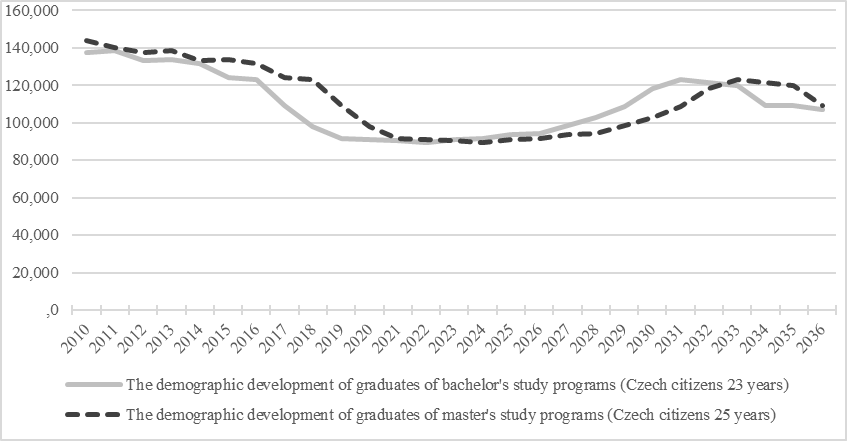
Figure
In the Czech Republic there are currently 72 universities. 26 of these universities are public, 2 are state universities and 44 are private universities. From the perspective of the forestry and wood technology sector they involve two faculties – the Faculty of Forestry and Wood Technology of Mendel University in Brno and the Faculty of Forestry and Wood Sciences at Czech University of Life Sciences Prague (FFWS CULS). They are both public universities. These faculties together produced 688 graduates of bachelor’s and master’s study programs in the year 2015. More detailed information about the trend of graduates of the FFWT MENDELU and the FFWS CULS are shown in Figure
The graph in the Figure
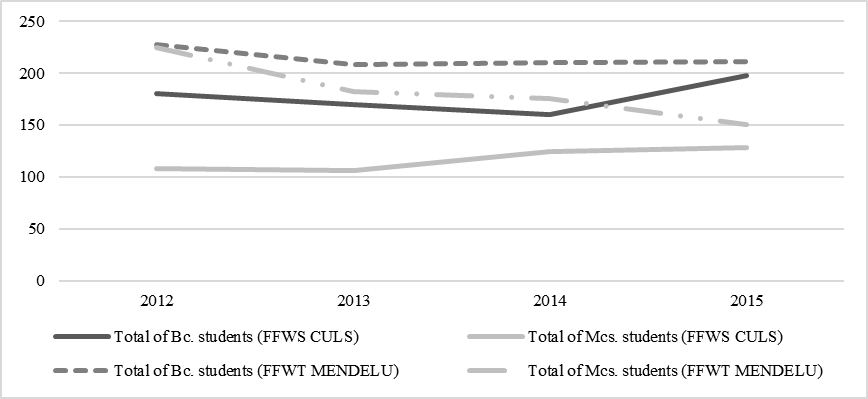
There was further investigated the actual trend in the quantity of unemployed graduates of the FFWT MENDELU according to study programs in order to be able to reject the first hypothesis. The quantity of unemployed graduates of the FFWT MENDELU registered at labor offices compared according to individual study programs is stated in Figure
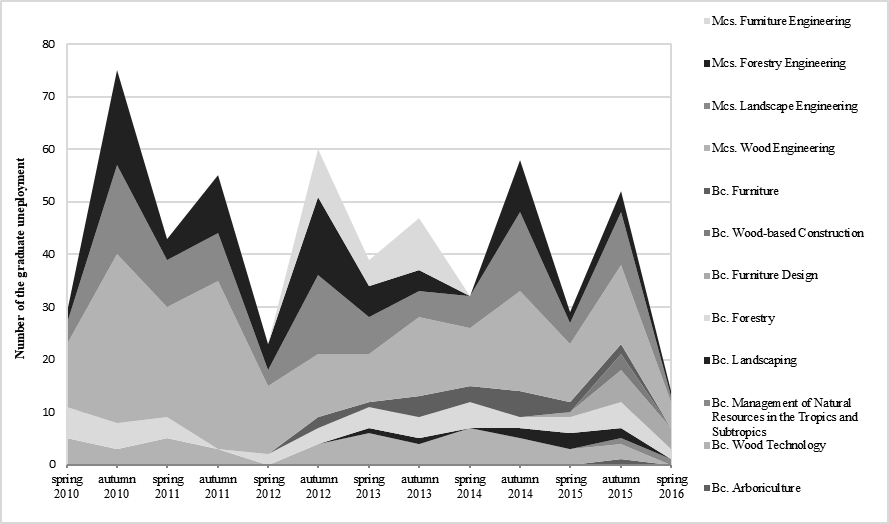
The analysis showed that the hypothesis no. 1 is not rejected. There were recorded big differences between the rates of employability of graduates of study programs of the FFWT MENDELU. According to results of the analysis it was found that the study programs Wood Technology (bachelor’s study program) and Wood Engineering (master’s study program) show the extremely high rate of students’ failure to be employed in the labor market. Problematic employability of graduates in the labor market leads also to low attractiveness of these programs among applicants and long-term decrease of the quantity of applications for this study program. Problems with employability are not so significant in case of other study programs. There is employability of 100% in case of those study programs that are not stated in Figure
Z výše uvedených důvodů bude dále příšpěvek zaměřen na dva neproblematičtější programy – bakalářský studijní program Dřevařství a magisterský studijní program Dřevařské inženýrství.
Due to the above stated reasons the contribution will be further focused on two most problematic programs – bachelor’s study program Wood Technology and master’s study program Wood Engineering.
The wood processing industry in the Czech Republic has been developing very fast in the last 5 – 10 years, there has been gradually completed transformation that started in the year 1989. There are being introduced new technologies of wood processing and production of wood products. A quantity and size of business subjects involved in the first processing of raw wood have been changing in the market. A majority of companies adjusts or changes the object and method of production. The competitive environment is getting stronger, especially due to the influence of foreign subjects. A large part of raw wood is without exported abroad any added value. Cooperation of suppliers and processors of raw wood within the forestry and wood technology sector has been slowly improving. The wood processing industry lacks capital to more penetrative investments to innovations of production technologies, improvement of logistic flows, increase of economic effectiveness and competitiveness. This situation requires more qualitative and actual education of students especially with “innovative approach and thinking” in this field.
The basic trends of the current wood processing industry in the field of primary processing of raw wood are:
modern and quickly changing processing technologies,
need of fast adaptability of small subjects to continuously changing market conditions,
decrease of middle-sized business subjects,
accent to maximal economic effectiveness and competitiveness of large subjects,
development of new materials based on wood according to wood species and their assortment,
low economic attractiveness of the field for new university applicants and employment in this area,
greater involvement of IT technologies in production and economic activities of business subjects,
advancing globalization and a greater need of language skills,
managerial conception of production and economic activities in processing of raw wood.
Table
In case of the bachelor’s study program Wood Technology there is the apparent low number of filled questionnaire in comparison to the master’s study program Wood Engineering, where 44.64% of the total number of 112 graduates filled the questionnaire.
The questionnaire survey among graduates showed their needs. During the study students need to gain theoretical knowledge to the necessary extent, practical skills including adequate practice in order to go as smoothly as possible to a work position at wood processing subjects, where they should quickly and efficiently engage in a full working process. Students should gain knowledge and skills during their study in such quality and scope, which would improve their employability in the labor market and increase demand for these graduates among their potential employers. Through more qualitative and market required education there should be created conditions for better financial evaluation of graduates, not only in case of a starting salary but also further financial evaluation. It is necessary to prepare students during their study for the opportunity to establish a long-term operation of a separate business entity in the studied field.
There were visited 132 potential employers from the created database of potential employers of graduates of the FFWT MENDELU within the South Moravian region and questionnaires were filled with them in the form of a personal interview. 25 questionnaires were obtained from forestry companies, 12 questionnaires from landscape companies, 6 questionnaires from arborist companies, 28 questionnaires from wood technology companies, 38 questionnaires from furniture companies, 20 questionnaires from companies in the field of wood construction and 3 questionnaires from companies in the field of furniture design. These numbers approximately represent a percentage share of graduates of the FFWT MENDELU in individual fields. In some field, the number of employers was increased in comparison to the plan in order to reach higher statistical representativeness in these study fields. In landscape and forestry fields, which are sufficiently represented by the planned number of employers, the number of actually addressed employers was decreased without any loss in statistical representativeness of the research.
Wood technology fields include potential employers of graduates of study programs Wood Technology and Wood Engineering. Overly, there were 28 companies addressed.
The following fact resulted from the questionnaire survey. Main employers of graduates of wood technology fields are small companies up to 25 employees, for which quality of applicants regardless their education is more important during a selection process than completion of bachelor’s or master’s study and especially practice of a graduate. Employers prefer a smaller number of more capable and qualitative graduates, i.e. they prefer quality over quantity. The research results imply necessity of better preparation and operational fitness of graduates of wood technology fields in the labor market in the context of real opportunities of current needs and offers of work places in the wood processing industry.
According to potential employers, students need practical professional knowledge and skills, language skills, work habits and interest in the filed in addition to theoretical skills. Employers prefer more general professional skills; focus on more actual and erudite education of technical and technological subjects and managerial and economic skills. From soft managerial skills they prefer independence, organizational and communication skills, reliability, motivation, work psychology and work with information. It is necessary to shorten time demand and reduce problematic transition of a graduate from study to operation, i.e. the process of adaptation and incorporation for practical performance in the studied field. Students should complete short-term as well as long-term internships, especially because of selection of more qualitative employees and as cheaper work force, which is currently much demanded. It is necessary to provide students during their study with prerequisites for subsequent professional growth and further lifelong education of graduates on respective leadership positions at wood processing subjects.
The both groups of respondents – graduates and potential employers agreed on one basic point, which is a level of practical skills of graduates. Insufficient practice of students seems to be the main reason for their low employability in the labor market. This statement can be proven by respondents’ answers to questions. In case of graduates, this issue was solved in the question “Do you think that the study orientation was from the perspective of usability in working life?” In case of wood technology subjects this question was answered by 55 of 60 people. Students were able to choose from 3 answers:
too theoretical – the answer was chosen by 37 people in wood technology fields (67.27%),
balanced from the perspective of theory and practice – the answer was chosen by 18 people (32.73%),
too practical – no one chose the answer.
In case of potential employers practice of graduates was solved in the question: “What knowledge or skills among graduates of the FFWT MENDELU do you lack the most?” Respondents chose from 4 options. Results are stated in Figure
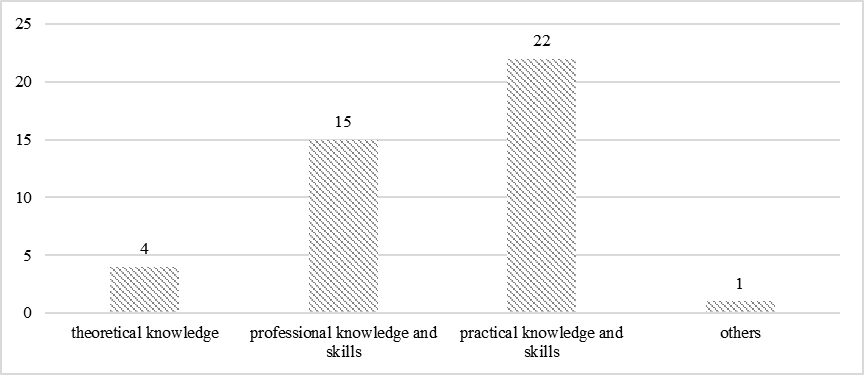
78.57% of 28 addressed companies believe that graduates of the FFWT MENDELU lack practical knowledge and skills. 53.57% potential employers expressed that graduates lack expert knowledge and skills. This part of the analysis confirmed that the hypothesis no. 2 is not rejected. One of the main reasons of low employability of students of the FFWT MENDELU is insufficient practice in the field.
It was further investigated, whether potential employers are willing to provide students of the FFWT MENDELU with practice or other professional actions, which could improve the current situation. These actions mean – work internships for students in the range of 2 – 6 months, short-term practice up to 14 days, professional excursions, assigning small projects to students (solving of seminar papers, etc.), assigning larger projects for bachelor’s and diploma theses. Results of answers are stated in Figure
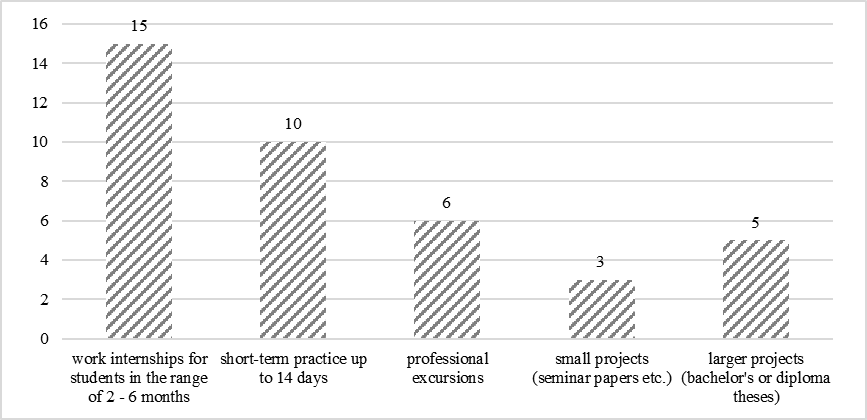
The most companies are willing to offer students a work internship in the range of 2 – 6 months, or short-term practice for students ranging up to 14 days.
Conclusion
The Faculty of Forestry and Wood Technology of Mendel University in Brno currently has 8 bachelor’s study programs and 7 master’s study programs. The contribution brings critical evaluation of employability of graduates of the Faculty of Forestry and Wood Technology. It uses detailed information acquired from the case study carried out in the South Moravian region. Results are applicable for decision-making of management of the FFWT.
The weakest study programs from the perspective of employability of graduates in the labor market were Wood Technology and Wood Engineering. The wood processing industry currently requires better prepared and focused university graduates who would possess theoretical knowledge, practical skills and another competence, which accurately reflect current requirements of the wood technology operations. The study programs Wood Technology and Wood Engineering can no longer reflect and fulfil requirements of current operations due to their obsolescence – out dating, certain inertia and conservatisms when trying to partially innovate these programs.
Potential employers require graduates to be significantly better prepared, especially regarding practical skills (practice), in specialist subjects of a given field and in managerial and economic subjects. Conversely, they do not require a range of theoretical general subjects such as chemistry or university math.
A majority of potential employers of graduates of the FFWT MENDELU is willing to offer work internships for students in the range of 2 – 6 months and short-term practice up to 14 days. The reason is the opportunity to select future more qualitative employees but also the fact that they are the source of cheaper work force, which is currently quite demanded.
Thanks to the conducted research of the labor market within the Subproject of the Institutional plan MENDELU 2016 – 2018 the management of the FFWT MENEDELU started to be fully aware of the problem with employability of their graduates in the labor market and they are able to react to it in the future. The given problem is needs to be solved by more significant innovation, thus the existing and unsatisfactory programs Wood Technology and Wood Engineering needs to be replaced at the bachelor’s level as well as at the master’s level by a new program, which would better correspond with current ideas of study applicants, current needs of the wood processing operation and better employability in the labor market by better composition of subjects, their content, way of education and engagement in practice.
At the moment, there is being prepared a new study program, which should replace the problematic study programs and attract new students to the FFWT MENDELU. However, in order to reach the set objective, it is necessary to support creation of new study programs by suitable modern marketing tools after obtaining of relevant accreditations.
The performed analysis reflects key documents of MENDELU and the FFWT. These include especially Long-term plans for education, scientific, research, development, artistic and other creative activities of MENDELU and the FFWT especially in the priority areas of the educational activity innovation, responsibility for employability of graduates, optimization of structure and improvement of quality of study programs, cooperation with the application sphere and the region.
Acknowledgements
The paper was prepared with the support of the Subproject of the Institutional Plan of Mendel University in Brno no. 7.2 Analysis of employability of graduates of the Faculty of Forestry and Wood Technology in the labor market 2016 – 2018.
References
- Andrews, J. & Higson, H. (2008). Graduate Employablitity, “Soft Skills’ Versus “Hard” Business Knowledge: A European Study. Higher Education in Europe, 33(4), 411-422.
- Ang, M.C.H. (2015): Graduate employability awareness: a gendered perspective. Procedia – Social and Behavioral Sciences, 211, 192-198.
- Askov, E. N. & Gordon, E. E. (1999): The brave new world of workforce education. New Directions For Adult and Continuing Education, 83, 59-68.
- CSO. (2016): Czech Demographic Handbook. Czech statistical office. Available at: http://www.czso.cz. (accessed 15th of July).
- Elias, P. & Purcell, K. (2004): Is Mass Higher Education Working? Evidence from the Labour Market Experiences of Recent Graduates. National Institute Economic Review, 190, 60-74.
- Fugate, M., Kinicki, A. J. & Ashforth, B. E. (2004). “Employability: A psychosocial construct, its dimension, and applications”. Journal of vocational behavior, 65(2), 14-38.
- Harvey, L. (2001): Defining and measuring employability. Quality in Higher Education, 7(2), 97-109.
- Hillage, J. & Pollard, E. (1998). Employability: Developing a framework for policy analysis. EfEE Research Briefing, 85, 85.
- Integrated Portal of the MLSA. (2016): Half-yearly statistics of graduates and young people in the labour office evidence. Integrated Portal of the Ministry of Labour and Social Affars of the Czech Republic. Available at: http://portal.mpsv.cz/sz/stat/abs/polo. (accessed 25th of June, 2016).
- Kreuzigerová, P. (2012). Pro pomoc na pracák? Euro,18. Available at: http://www.euro.cz/archiv/po-promoci-na-pracak. (accessed 21st of July, 2016).
- Lees, D. (2002): Graduate Employability – Literature Review. Available at: http://www.qualityresearchinternational.com/esecttools/esectpubs/leeslitreview.pdf. (accessed 5th of July).
- Leuven/Louvain-la Neuve Communiqué. (2009): Communiqué of the Conference of European Ministers Responsible for Higher Education, Leuven and Lovain-la Neuve, 28-29 April 2009. The European Higher Education Area. Available at: http://www.ehea.info/Uploads/Declarations/Leuven_Louvain-la-Neuve_Communiqu%C3%A9_April_2009.pdf. (accessed 16th of July, 2016).
- London Communiqué. (2007): Towards the European Higher Education Area: responding to challenges in a global word. The European Higher Education Area. Available at: http://www.ehea.info/article-details.aspx?ArticleId=43. (accessed 16th of July, 2016).
- McKeown, T. & Lindorff, M. (2011). The graduate job search process – A lesson in persistence rather than good career management?. Education and Training, 63, 201-320.
- Moreau, M.-P. & Leathwood, C. (2007). Graduates’ employment and discourse of employability: a critical analysis. Journal of Educaton and Work, 19(4), 305-324.
- Morley, L. (2001): Producing New Workers: Quality, equality and employability in higher education. Quality in Higher Education, 7(2), 131-138.
- Nystrom, S. (2008). A winding road – Professional trajectories from higher education to working life: A case study of political science and psychomogy graduates. Studies in Continuing Education, 30, 215-229.
- Possa, G. (2006): Europe’s Universities Response to Europe’s Challenges. Higher Education in Europe, 31(4), 355-357.
- Rothwell, A., Jewell, S. & Hardie, M. (2009). Self-perceived employability: Investigating the responses of post-graduate students. Journal of Vocational Behavior, 75, 152-161.
- Schultz, T. W. (1963). The Economics Value of Education (3rd ed.). New York and London. Columbia. University Press.
- Sleezer, C.M., Gularte, M.A., Waldner, L. & Cook, J. (2004): Business and Higher Education Partner to Develop a High-skilled Workforce: A Case-Study. Performance Improvement Quarterly, 17(2): 65-82.
- Sobotková, E., Dohnalová, Z. (2014): Modern Problems of the Integration of Graduates in the Czech Labour Market. Procedia – Social and Behavioral Science, 143, 1048-1054.
- Teichler, U. (2003): The Future of Higher Education and the Future of Higher Education Research. Tertiary Education and Management, 9(3), 171-185.
- The Bologna Declaration. (1999): The Bologna Declaration of 19 June 1999. The European Higher Education Area. Available at: http://www.ehea.info/article-details.aspx?ArticleId=5. (accessed 15th of July, 2016).
- The South Moravian Region. (2016): Portal of the South Moravian Region. Available at: http://www.kr-jihomoravsky.cz/Default.aspx?ID=961&TypeID=1. (accessed 19th of July, 2016).
- Wickramasinghe, V. & Perera, L. (2010): Graduates’, university lecturers’ and employers’ perceptions towards employability skills. Education + Training, 52(3), 226-244.
Copyright information

This work is licensed under a Creative Commons Attribution-NonCommercial-NoDerivatives 4.0 International License.
About this article
Publication Date
22 November 2016
Article Doi
eBook ISBN
978-1-80296-015-0
Publisher
Future Academy
Volume
16
Print ISBN (optional)
-
Edition Number
1st Edition
Pages
1-919
Subjects
Education, educational psychology, counselling psychology
Cite this article as:
Hlaváčková, P., Lenoch, J., & Březina, D. (2016). Analysis of the Graduate Employability at the Labour Market. In Z. Bekirogullari, M. Y. Minas, & R. X. Thambusamy (Eds.), ICEEPSY 2016: Education and Educational Psychology, vol 16. European Proceedings of Social and Behavioural Sciences (pp. 203-215). Future Academy. https://doi.org/10.15405/epsbs.2016.11.21

